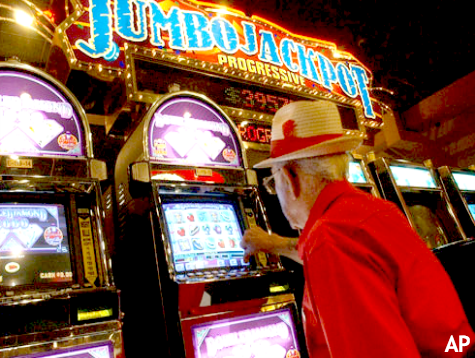
Leaders in the horse racing industry are heading up the charge to bring casino-style gambling to Texas and many Lone Star State residents are behind them. The horse racing business continues to decline in Texas, and many Lone Star State residents claim that legalizing casino-style gambling would help revitalize the once-booming industry.
Racing brought $5.5 billion to the Texas economy per year at the industry’s peak. But now the horse industry has largely moved from Texas to neighboring states offering higher purses and large, casino-stylegambling. According to the Texas Racing Commission, horse racing attendance in the state dropped 12 percent and wagers dropped 23 percent in 2011. Meanwhile, the horse racing industry in Oklahoma has expanded significantly in recent years, bringing the state $3.6 billion in revenue during 2012 alone.
CEO of Sam Houston Race Park, Andrea Young, told the Sugar Land Sun, “How can we compete with surrounding states where the horses can compete for two to three times the amount of money in Louisiana or Oklahoma? Absent any new revenue, the ways we were going to do that was cutting our supply, allowing us to have more revenue to spread over shorter times.”
Young and a growing group of Texans plan to push for the legalization of casino-style gambling in Texas.
Let Texans Decide, a group “focused on urging the state legislature to provide our citizens with the opportunity to vote on legalizing gaming,” will be key in that effort. A spokesperson from the group told Breitbart Texas, “Due to legislative inaction, over $4 billion will be spent by Texans this year in neighboring states before the next legislative session begins.”
Indeed, Texans spend billions gambling in neighboring states per year. Both Louisiana and Oklahoma house numerous, expansive Vegas-style casino resorts that attract large crowds from around the U.S.
Let Texans Decide argues that legalizing casino-style gambling in Texas would bring $8.5 billion in economic growth not just to local communities, but to the entire state. Additionally, 75,000 jobs would be added in the Lone Star State, the group claims.
Republican State Rep. Allen Fletcher said Texans should get a chance to vote on the issue. He told the Sugar Land Sun, “We’ve never had the opportunity, as legislatures in the state of Texas, to cast a vote allowing the people of Texas to vote. I’ve heard many times that people have said they want this in our area, and I’ve always said it’s your decision. If I get the opportunity to put it on the ballot, I will.”
Earl Grinols, an expert on the impacts of gambling legislation and a professor at Baylor University, claims that research measuring gambling’s cost and benefits reveals that society is better off without gambling.
He said that legislators often claim the state will make money by taxing gambling. But Grinols found that for every one dollar of benefits from gambling, society loses three dollars on costs such as law enforcement and social services.
“People have committed crime up to and including murder and committed suicide as a result of gambling,” Grinols said. “Casinos sometimes levy lawsuits against people to collect gambling debts. In certain cases, people are losing their homes overgambling.” In his view, crime, debts, suicide, and loss of housing cost the state more than it makes fromgambling.
Tony McDonald, General Counsel for the political advocacy group Empower Texans, agreed that there are significant negative societal impacts that come with the legalization of casino-style gambling. He told Breitbart Texas, “The gambling industry sells false hope for people who don’t understand probabilities. The industry is designed to dazzle people and trick them out of their money. They give the free drinks for a reason–they want you to stick around. The longer you stay, the more likely you are to lose your money.”
It is often the poorest and most vulnerable in society who are gamed by such false hope, McDonald said.
McDonald noted that a lot of conservatives claim to be pro-gambling because they see it as a free market issue. Texans shouldn’t be fooled, he argued–the legalization of gambling will inevitably invite the expansion of regulatory schemes. “The problem is, when we talk about gambling, we’re not talking about getting together in a room and having a poker game,” he said. “We’re not talking about a free activity in the market.Gambling is one of the most regulated industries in the U.S. By legalizing gambling, you’re creating another stake holder in government.”
He joked, “Battleground Texas would love nothing more than a cash cow of casinos to fund liberal Democrats.”
Texas is currently only one of ten states that do not allow casino-style gambling. The state’s deeply-rooted Baptist roots likely made the population more resistant to gambling than other states, McDonald said.
Still, gambling has recently taken the U.S. by storm. 20 years ago, gambling was only legal in two states–now, some form of gambling is legal in 48 states.
“The reason we haven’t turned, along with so many other states, is that we’re more conservative,” McDonald said. “We’re not dashing after every little glitzy promise of prosperity. We stick to wise public policy.”
Grinols said, “Texas is doing well economically such that it doesn’t need gambling. Of all the jobs that President Obama has created during his time in office, Texas has created more than the rest of the states combined. Gambling needs Texas much more than Texas needs gambling.”
Follow Kristin Tate on Twitter @KristinBTate.

COMMENTS
Please let us know if you're having issues with commenting.